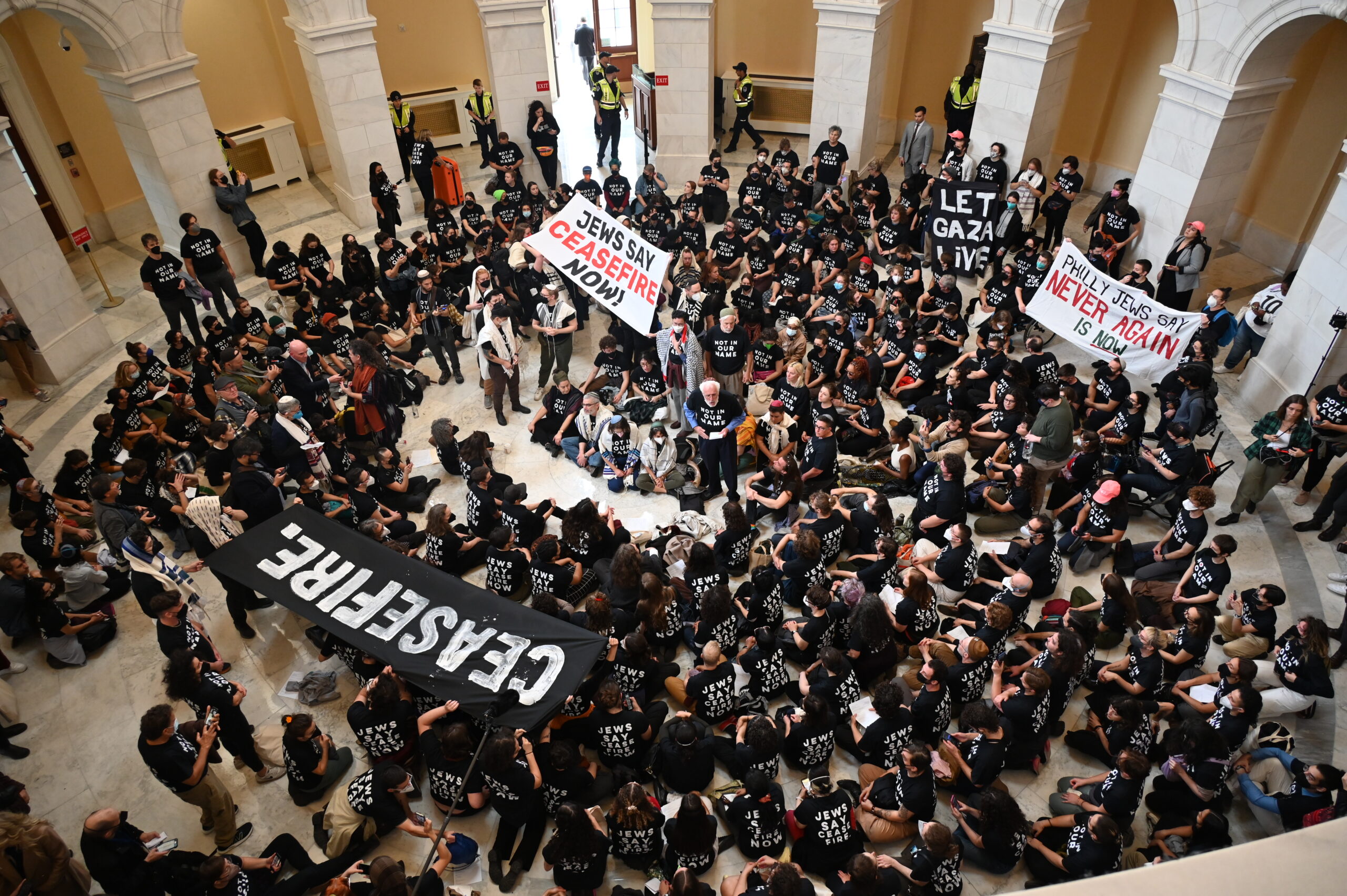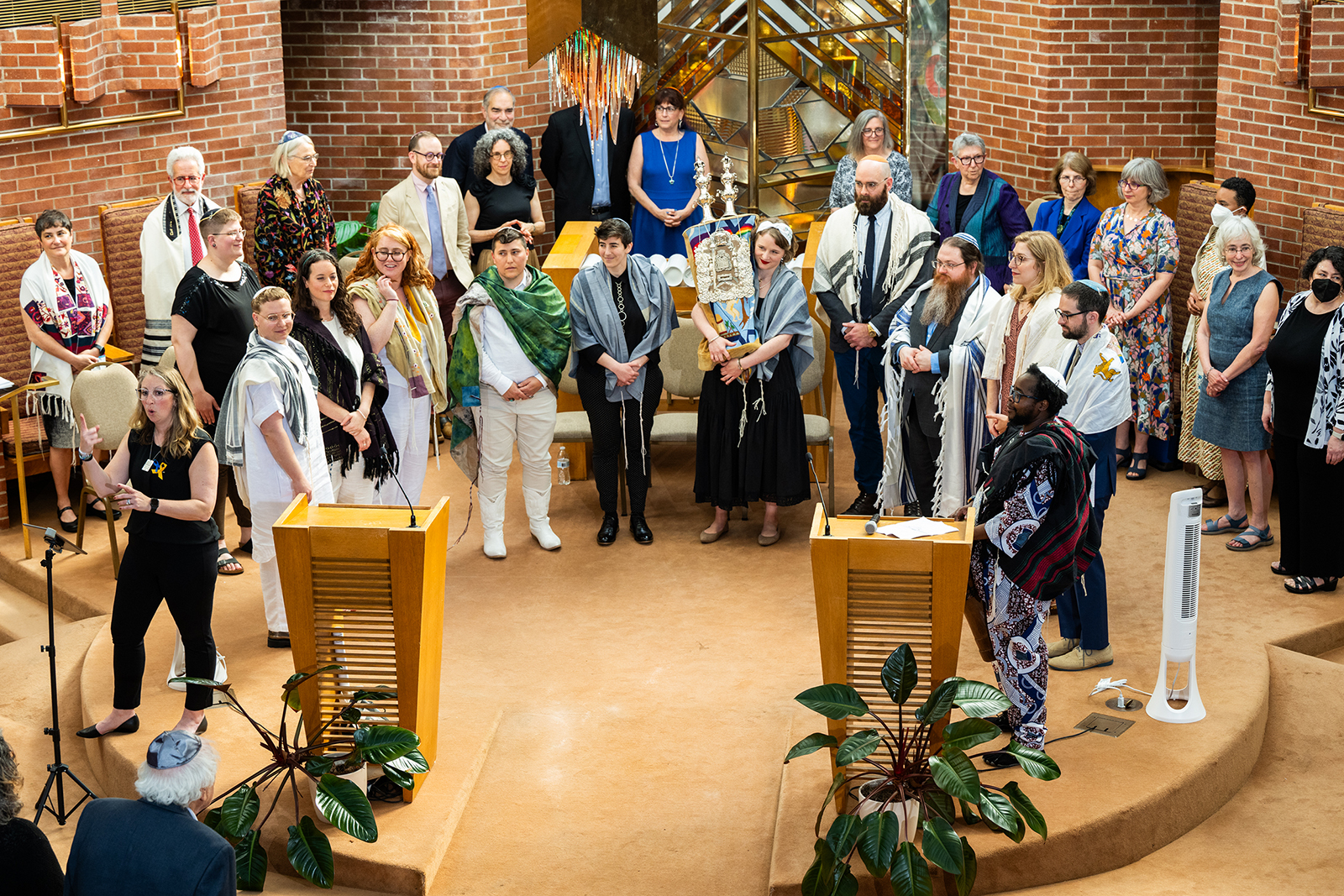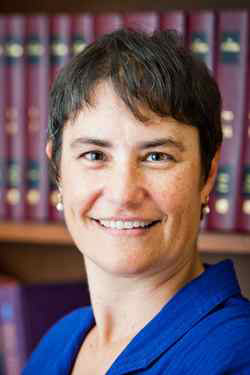The Reconstructionist Rabbinical College still defines itself as Zionist and is committed to Israel's existence and its right to self defense. But it is also open to other perspectives.
May 24, 2024
By Yonat Shimron

Hundreds of demonstrators calling for a cease-fire in Gaza gather in the U.S. Capitol’s Cannon House Office Building rotunda on Oct. 18, 2023. The group was primarily organized by Jewish Voice for Peace. (RNS photo/Jack Jenkins)
(RNS) — Late last year, hundreds of protesters crowded the U.S. Capitol to protest Israel’s brutal invasion of Gaza, shouting “cease-fire now,” and “not in our name.”
Among them were two-dozen rabbis and three self-declared anti-Zionist rabbinical students from the Reconstructionist Rabbinical College in Wyncote, Pennsylvania.
Last week, their peers wrapped them in a tallit, or prayer shawl, and their elders handed them an ordination diploma at a graduation ceremony in the sanctuary of a nearby synagogue.
The three — Noah Rubin-Blose, Eli Carson Dewitt and Rachel Kipnes — are long-time activists in Jewish Voice for Peace, an anti-Zionist organization. They are proud of their commitment both to equal rights for Israelis and Palestinians as well as to Jewish study and ritual.
They are among a small but growing group of rabbinical students who are challenging American Jews to rethink their long standing allegiance to Israel and to the Zionist project of building and maintaining a Jewish-dominated state.

The Reconstructionist Rabbinical College graduated and ordained 11 new rabbis on May 19, 2024, at the Old York Road Temple – Beth Am in Abington, Pennsylvania. (Photo by Jordan Cassqay)
This year, following Israel’s ongoing assault on Gaza, which has resulted in the deaths of more than 35,000 Palestinians, the passion and organization of the anti-Zionist movement has become a force to be reckoned with. Mounting their largest demonstrations ever, they have grabbed national headlines, most recently helping to support a wave of campus encampments.
In the process, they have confounded mainstream Jewish institutions, some of which have labeled them antisemitic. After the shock of the Hamas attack on Israel that killed some 1,200 people, most of them Israeli, many American Jews found themselves fractured and divided.
“We have had our hearts broken repeatedly,” acknowledged Rabbi Deborah Waxman, president of the Reconstructionist Rabbinical College during the May 19 graduation, alluding to the difficult seven months since Oct. 7. “We have been forced to, like it or not, discover new resilience.”

Rabbi Deborah Waxman. (Photo courtesy Creative Commons)
But Waxman also made clear during the ordination ceremony that the Reconstructionist movement is willing to embrace critics of Israel, including anti-Zionists, as it forges a new post-Oct. 7 path.
The rabbinical school, she said, does not have a litmus test on Israel or Zionism.
“There is a litmus test,” Waxman told the graduates and their families. “It is a litmus test about the capacity to center relationships and to build covenantal communities across our differences.”
Reconstructionist Judaism is the smallest of the American Jewish denominations, with 95 congregations representing about 46,000 people. Founded in the early 20th century by Rabbi Mordecai Kaplan, Reconstructionism understands Judaism to be “the evolving religious civilization of the Jewish people.”
The movement still defines itself as Zionist and is committed to Israel’s existence and its right to self defense. But, Waxman said, it is also open to other perspectives.
The college requires students to spend a 10-12 week summer session in Israel, although for some of the 11 men and women ordained as rabbis this month, that requirement was waived because of COVID. The three anti-Zionist rabbinical students said they were grateful for that exemption.
Most other Jewish rabbinical schools also require students to spend time in Israel. The Reform movement’s Hebrew Union College requires a full year of study at its campus there.

Eli Carson DeWitt, a rabbinical student at the Reconstructionist Rabbinical College, is handcuffed and arrested at the U.S. Capitol on Dec. 19, 2023, during a protest calling for a cease-fire in Gaza. (Photo courtesy Rachael Warriner)
In interviews after their graduation, these anti-Zionist rabbis said it was precisely their activism that drove them to embrace a commitment to Jewish religious practice and a desire to study for the rabbinate.
“Organizing work was, and continues to be, very important to me, and it’s what drew me to rabbinical school as well — a desire to serve my Jewish community, which was, and is, the Jewish left,” said Noah Rubin-Blose, who is 40.
Last year, while still a student, Rubin-Blose started an anti-Zionist congregation called “Makom” in his hometown of Durham, North Carolina. Its outdoor High Holiday services this past fall drew about 200 people.
He is also continuing his activism. In April, he and 30 rabbis and activists flew to Israel in an attempt to deliver food aid to Gaza through the Erez crossing in the northern end of the Gaza Strip. They were repelled by the Israeli army, which prevented them from doing so.
Rubin-Blose, who is a trans man, was turned on to activism as a high school student through the global justice movement and later the LGBTQ+ movement and Black Lives Matter.

A delegation of American and Israeli rabbis from Rabbis for Ceasefire and other activists march toward the Erez crossing to the Gaza Strip with food aid for Gaza civilians and to call for a cease-fire, in southern Israel, Friday, April 26, 2024. (AP Photo/Maya Alleruzzo)
Eli Carson DeWitt, 31, grew up in a Conservative Jewish home that valued “tikkun olam,” the Jewish imperative to “repair the world.” DeWitt, who uses they/them pronouns, said it was their older sister’s anti-war activism that set them on the anti-Zionist course.
Rachel Kipnes, 32, grew up a Reform Jew. She went to Jewish day school and attended Jewish camps and Jewish youth groups. While living in New Orleans after college, she became active in Jewish Voice for Peace and realized, she said, “her anti-Zionism and Jewish practice were actually one and the same.” She said her mission is to work toward envisioning a Judaism of liberation and solidarity — “one where Palestinians are free, one where antisemitism no longer exists, where Islamophobia is not baked into the core of institutions.”
Before 1948, unconditional support for Israel and for Zionism was not always a given in American Jewish society. But over the past few decades, especially since 1967, it has gradually evolved into the status quo. For many older and more traditional Jews, the reality of anti-Zionism has been hard to swallow.
At least two rabbinical students left the Reconstructionist Rabbinical College this past academic year saying they found it a hostile environment for pro-Israel Jews.
“We were … surprised by the loud anti-Zionist sentiment among the student body and the culture of silence and intimidation that dissuaded students from expressing any positive connection with Israel,” wrote Talia Werber and Steven Goldstein in an op-ed in The Forward.
Werber and Goldstein first tried to fight back by forming a Students Supporting Israel chapter. Of the 55 students at the rabbinical college this past year, only eight joined and several later withdrew.

The Reconstructionist Rabbinical College graduated and ordained 11 new rabbis on May 19, 2024, at the Old York Road Temple – Beth Am in Abington, Pennsylvania. (Photo by Jordan Cassqay)
The two told RNS they were accused of being racist for supporting Israel.
“For me, as somebody who stood for racial justice, to be called a white supremacist because I believe Israel has the right to exist, this was brutal for me and, God knows, I have my problems with the Netanyahu government,” said Goldstein, a 61-year-old lawyer who is now enrolled at another Jewish rabbinic school.
Other graduates said they found the anti-Zionist students to be tolerant, supportive and caring of their Zionist peers.
“I don’t feel like any of us would say that we were disrespected,” said Adam Strater, who also graduated last week. “In spaces that have been traditionally Zionist, people who are non-Zionists or anti-Zionists, their very presence is interpreted as a sort of protest when they’re just trying to learn like anybody else.”
There are at least five other self-declared anti-Zionists at the school who will be ordained in the years ahead. More than half of the Jewish Voice for Peace’s 45-member rabbinical council is made up of Reconstructionists. Among the group, Rabbis for Ceasefire, which does not define itself as anti-Zionist, about 30% are Reconstructionist rabbis, far higher than their percentage in the American Jewish population.
“We can, and we will, do more at helping our students to know how to talk about the diversity of opinion around Israel and Palestine,” said Waxman. “Part of what we think about training rabbis is about helping them to be in community with people they don’t always agree with. We need communities of people who don’t always agree with one another.”
No comments:
Post a Comment